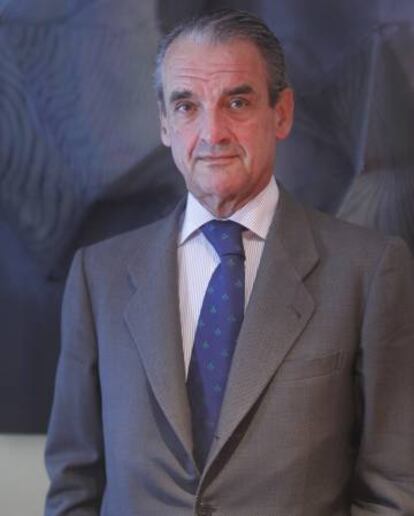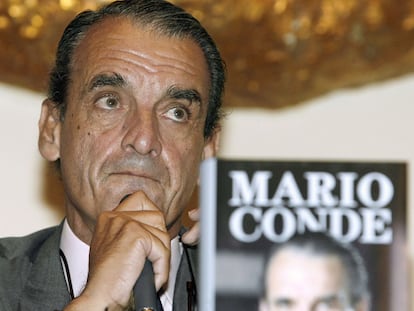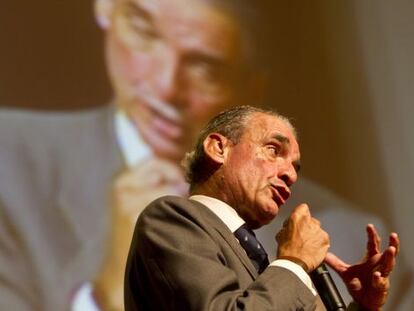Four hours with Mario
In the wake of the arrest of the disgraced former Banesto chief, EL PAÍS business reporter Íñigo de Barrón recalls a 2013 interview with Conde


To talk to Mario Conde about Banesto is like rewinding a movie all the way to the beginning, because his rhetoric has not evolved one bit.
He displays not the slightest sign of self-criticism or pity for the people who believed in him, and ended up losing it all.
As he sees it, the real culprits – all the members of the System, in its broader sense – are still out there, and continued to live quite well while his own life went to pieces and he himself went to jail.
He has not forgotten a single name on the list of predators who, he feels, went after him. The least important thing in this entire story, to him, is the disastrous state in which he left Banesto’s accounts, a fact that was certified at his trial by the Bank of Spain’s most veteran inspectors.
As he sees it, the real culprits – all the members of the System, in its broader sense – are still out there
I went to see Mario Conde in December 2013. The visit took place inside his Madrid home, in the luxury estate of El Viso – in the very same house that the Civil Guard searched on Monday as part of a new investigation into Conde’s financial activities.
I was interviewing him on occasion of the 20th anniversary of the state’s takeover of Banesto. Our one-on-one lasted a little over four hours, from 4.30pm to just past 8.30pm.
I was shown indoors by the house staff, and a few minutes later Mario Conde himself came down the stairs, looking older at close quarters than any of the latest photographs I had seen of him. We were served water, tea and coffee.
We were alone for much of the time, then were joined by Paloma, his lifelong secretary and a person whom he trusts fully. Besides nodding vigorously when Conde made rotund statements, she also supplied the occasional piece of information that the former banker himself could not immediately recall. She was like his living agenda.
During all that time, Conde barely sat down at all. He paced continually inside the living room, which was decorated in a classic, old-fashioned style that did not match the modern (even youthful) lifestyle he claimed to be living. He adopted the attitude of a teacher delivering a lesson.
I did the same things all the other bankers were doing. I helped the parties, helped the monarchy with several things... but don’t write that down Mario Conde
“I did the same things all the other bankers were doing. I helped the parties, helped the monarchy with several things... but don’t write that down, because I don’t want any more trouble. I’m telling you about it, but don’t publish it,” he said on several occasions during the interview, as a way to build up an image of himself as a powerful man who, at one point, crossed a line and became everyone’s enemy.
In the end, he unveiled his theory: his own decision to enter politics became a matter of concern for both the Socialist Party (PSOE) and the Popular Party (PP), who decided to get him out of the way.
His own economic situation came up at one point during our encounter: “I mostly write, and provide legal advice on important issues to people who request it, normally out of a sense of obligation. Right now I have no business activities.”
Yet the lifestyle that emerged from the conversation and from our immediate surroundings – the house, the chauffeur, the luxury cars, the trips he mentioned – did not fit in with this description.
Asked about the allegations of asset stripping, which other bankers have always lobbed at him, Conde grew earnest and denied it. He talked about his own enormous losses due to the expropriation of Banesto.
He never once put a name to the cause of that harm. The harm “was done,” in his words
“But small shareholders were ruined, some of them lost everything they had because they bought Banesto shares at 1,200 pesetas and a few months later they were worth half or less of that...” I noted.
“I lost the equivalent of €220 million,” he retorted. “It’s true that harm was done to the shareholders who sold, although it was less bad for those who held on, because the shares recovered later...”
He never once put a name to the cause of that harm. The harm “was done,” in his words. The fact is that dividends were canceled and Banesto stock was at rock bottom prices for years and years.
The true part about Conde’s statements was that his was not the only bank in trouble. Central Hispano was also on the brink of bankruptcy, but its managers were a lot more disciplined and accepted the Bank of Spain’s instructions. Conde never did, because he was afraid of losing his money and his power.
And he continues to display the same attitude today, even though he has lost his power and, perhaps, all of his money as well.
English version by Susana Urra.









































